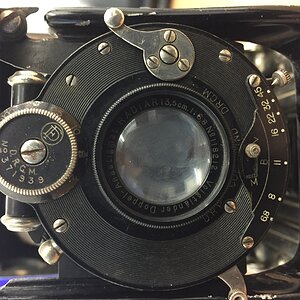- Joined
- Nov 11, 2003
- Messages
- 9,900
- Reaction score
- 119
- Location
- Ahwatukee, AZ
- Can others edit my Photos
- Photos NOT OK to edit
I received today a letter from a friend photographer, Mr. William McEwen. I attached it here, for everyone to see and take note:
12 May 2005
It happened again. This evening. An event occurred on my street, and I walked outside to photograph it. Youngsters had been racing in the elementary school parking lot. The driver lost control of the car, the car veered onto a curb, then back into the parking lot, hitting a parked car.
Two fire trucks, several police cars, and an audience. I walked over and photographed a police officer speaking with a witness. I was about 10 feet away.
I was using my trusty 1953 Rolleiflex 2.8C, which is perfect in such circumstances. It is lightweight, small, and quiet.
You need to put that thing away, the officer snapped at me.
I knew my rights. When youre out in public, anything is fair game for anyone with a camera. That is the law, and the courts have ruled so time and time again.
Why? I asked, trying to sound as polite and friendly as possible.
Youre not allowed, she explained.
Im not? I asked.
Are you just a local resident?
Yes.
Well, stop taking pictures, the officer said. Youre interfering with my investigation.
(Total BS, and she knew it.)
I dont want to interfere, I said humbly, and backed away.
Three Arlington firemen were standing on the grass, chatting. I mentioned the October 2004 incident, where an Arlington firefighter told me I couldnt take pictures of an accident. (I wrote to the fire department about it. A fire department representative called me, apologized, and said he had informed Arlingtons firefighters that citizens have every right to take pictures at the scene of an accident.)
I asked the firefighters present if theyd be informed. They said no.
As the investigation continued, I stayed on the sidewalk the most public of public areas- to play it safe. Despite the fact that the law was on my side, I knew that the police officer (who was either uninformed or just didnt give a damn about the law) could make my life miserable if she felt like it. She wanted to intimidate me and she succeeded.
I shot a few more pictures over the next hour, all from the vantage point of the sidewalk. I found it interesting that the many spectators who were chatting and laughing in very close proximity to her posed no interference to her investigation. The spectators included an elementary school age boy dribbling a basketball two feet away from the officer.
At this moment Im sitting here, steamed that I allowed her to intimidate me and prevent me from doing what I do, something that is perfectly legal. Once again, I allowed this to happen.
Dont let this happen to you! We need to educate our public servants about citizens rights.
Like last time I wrote about this issue, attached is a one sheet summary of your rights as a citizen to take photographs in public places. I urge you to make plenty of Xeroxes and carry them in your camera bag.
The summary was prepared by Bert P. Krages II, an Oregon attorney. Hats off to you, Mr. Krages, for placing this on the Web (www.krages.com/phoright.htm) for all of us.
As always,
William McEwen
I think it's very important that photographers know their rights and Mr. McEwen's advice on carrying a copy of the Photographers Rights is perhaps one of the most important pieces of 'equipment' to be carried in a camera bag. Feel free to forward this website to all your friends, pro or amateur photographers alike.
Taking Pictures Is Not a Crime
Part Three of an (unfortunately) Ongoing Saga
Part Three of an (unfortunately) Ongoing Saga
12 May 2005
It happened again. This evening. An event occurred on my street, and I walked outside to photograph it. Youngsters had been racing in the elementary school parking lot. The driver lost control of the car, the car veered onto a curb, then back into the parking lot, hitting a parked car.
Two fire trucks, several police cars, and an audience. I walked over and photographed a police officer speaking with a witness. I was about 10 feet away.
I was using my trusty 1953 Rolleiflex 2.8C, which is perfect in such circumstances. It is lightweight, small, and quiet.
You need to put that thing away, the officer snapped at me.
I knew my rights. When youre out in public, anything is fair game for anyone with a camera. That is the law, and the courts have ruled so time and time again.
Why? I asked, trying to sound as polite and friendly as possible.
Youre not allowed, she explained.
Im not? I asked.
Are you just a local resident?
Yes.
Well, stop taking pictures, the officer said. Youre interfering with my investigation.
(Total BS, and she knew it.)
I dont want to interfere, I said humbly, and backed away.
Three Arlington firemen were standing on the grass, chatting. I mentioned the October 2004 incident, where an Arlington firefighter told me I couldnt take pictures of an accident. (I wrote to the fire department about it. A fire department representative called me, apologized, and said he had informed Arlingtons firefighters that citizens have every right to take pictures at the scene of an accident.)
I asked the firefighters present if theyd be informed. They said no.
As the investigation continued, I stayed on the sidewalk the most public of public areas- to play it safe. Despite the fact that the law was on my side, I knew that the police officer (who was either uninformed or just didnt give a damn about the law) could make my life miserable if she felt like it. She wanted to intimidate me and she succeeded.
I shot a few more pictures over the next hour, all from the vantage point of the sidewalk. I found it interesting that the many spectators who were chatting and laughing in very close proximity to her posed no interference to her investigation. The spectators included an elementary school age boy dribbling a basketball two feet away from the officer.
At this moment Im sitting here, steamed that I allowed her to intimidate me and prevent me from doing what I do, something that is perfectly legal. Once again, I allowed this to happen.
Dont let this happen to you! We need to educate our public servants about citizens rights.
Like last time I wrote about this issue, attached is a one sheet summary of your rights as a citizen to take photographs in public places. I urge you to make plenty of Xeroxes and carry them in your camera bag.
The summary was prepared by Bert P. Krages II, an Oregon attorney. Hats off to you, Mr. Krages, for placing this on the Web (www.krages.com/phoright.htm) for all of us.
As always,
William McEwen
I think it's very important that photographers know their rights and Mr. McEwen's advice on carrying a copy of the Photographers Rights is perhaps one of the most important pieces of 'equipment' to be carried in a camera bag. Feel free to forward this website to all your friends, pro or amateur photographers alike.











![[No title]](/data/xfmg/thumbnail/37/37606-3c9ffb5906173fa2aa489341967e1468.jpg?1619738148)

